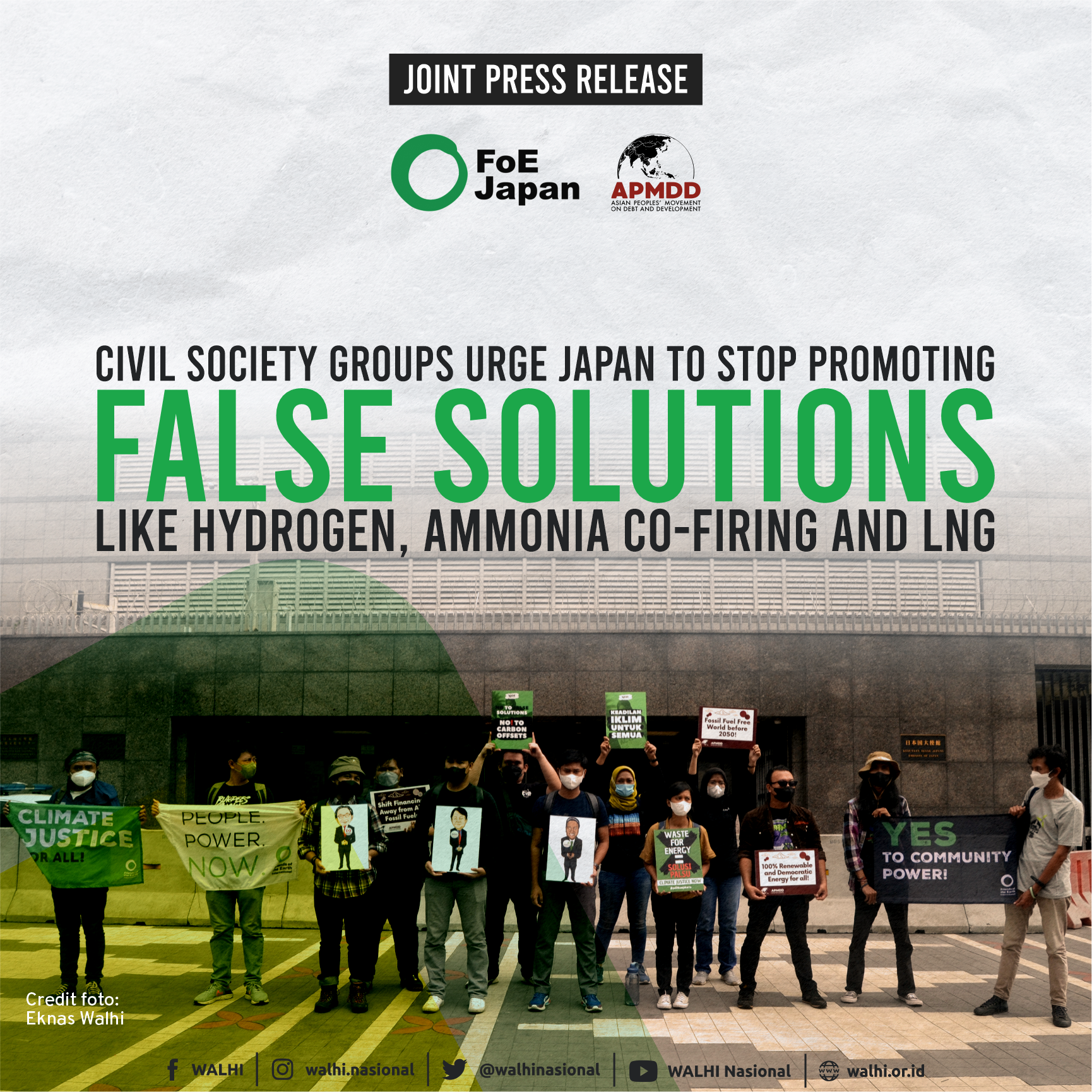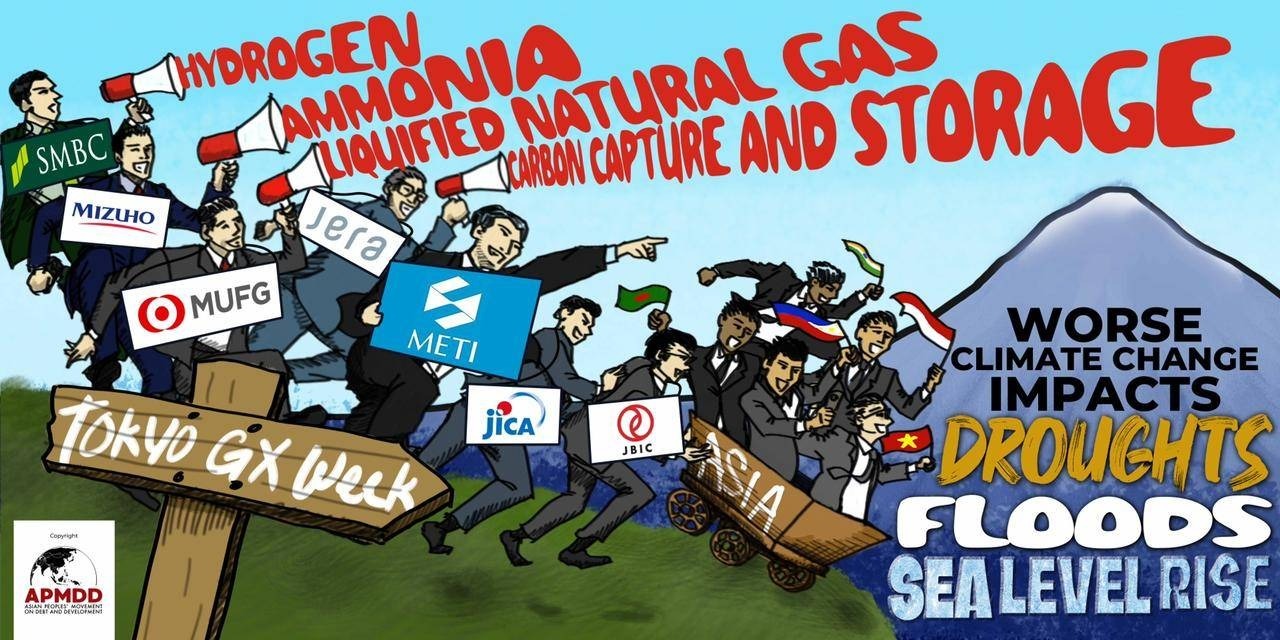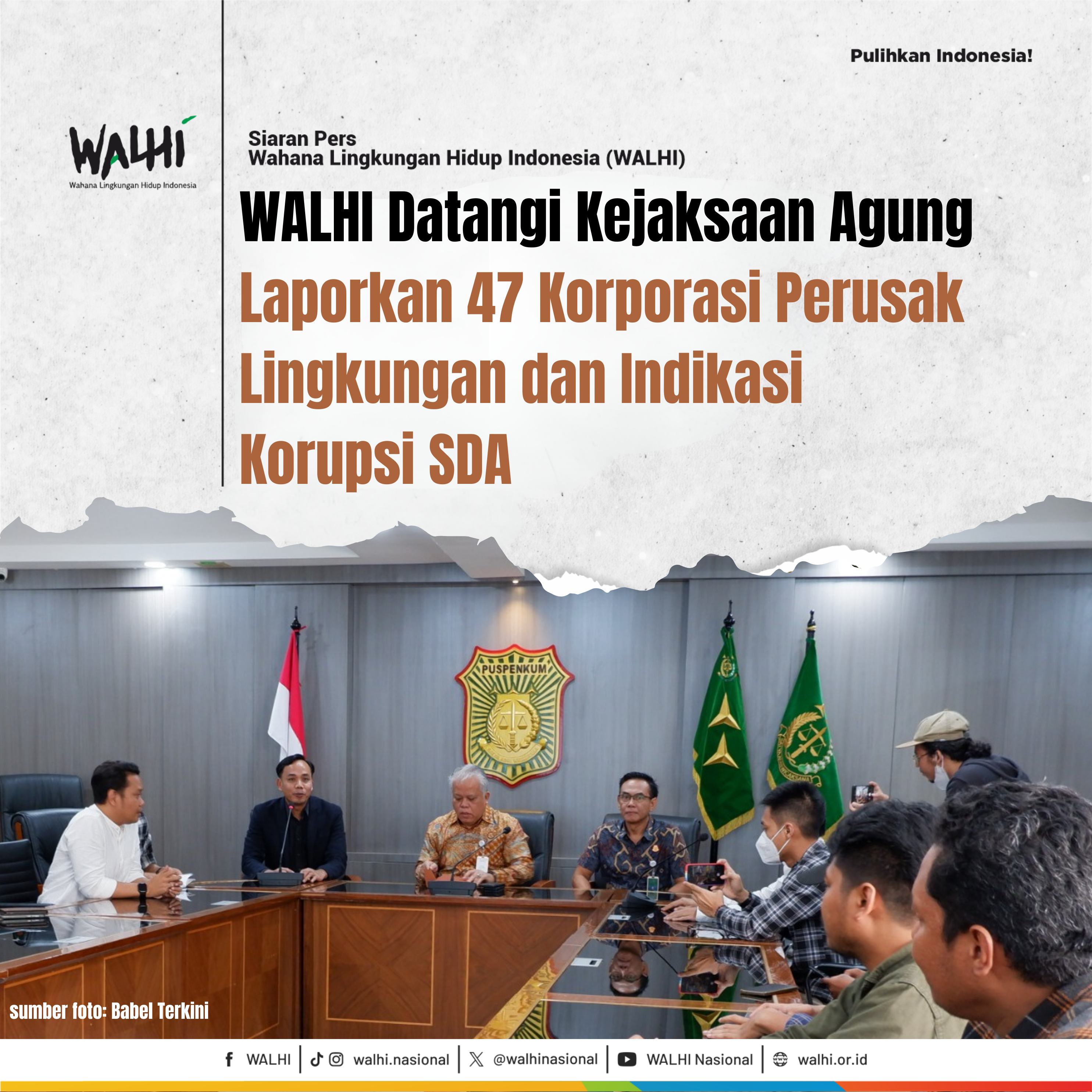
2022年9月26日
プレスリリース(日本語)
国内外のNGO、気候変動に対する日本政府の誤った対策に抗議の声
水素、アンモニア、LNGなどは気候変動対策にはならない
本日9月26日から10月7日まで、経済産業省が「東京GXウィーク」を主催する。日本は化石燃料に対する最大の公的資金供与国でもある。
岸田政権の下、脱炭素政策を進めるため、「グリーントランスフォーメーション(GX)」の議論が行われているが、日本政府はかねてより「各国がおかれる状況はさまざまであることから実効的な排出削減に向けた取組を進めていくためには、画一的なアプローチではなく、多様な実態を踏まえて、幅広い技術やエネルギー源を活用した『トランジション』を加速化していくことが不可欠」とし、途上国の脱炭素化支援の一環として水素やアンモニア燃料の推進を図っている。
しかし、現在入手可能な水素・アンモニアは化石燃料から作られるものがほとんどで、それを既存の石炭やガス火力で混焼しても、温室効果ガスの排出削減効果はほとんどないか、むしろ排出を増加させる。さらに再生可能エネルギーの価格が下がる中、経済性もない水素・アンモニアを推進するのは脱炭素化を遅らせることにしかならず、化石燃料依存が続くことになるだけだ。
気候危機は喫緊の課題である。パキスタンは国土の三分の一が水没するような災害が起こり、800万近くもの人々が避難民となるような人道危機に見舞われている。世界中で、特に途上国において気候危機の影響が深刻になっている。私たちに必要なのは、化石燃料依存からの脱却であるが、日本政府が推進するGX戦略は、化石燃料にまみれたものだ。
こうした日本政府の「誤った対策」の押し付けに対して、各地で反対の声があがっている。26日のGXウィーク開幕に合わせ、日本やインドネシアなどの市民団体はアクションを行った。
Asian Peoples Movement on Debt and Development(APMDD、「債務と開発に関するアジアの民衆運動」)のリディ・ナクピルは「毎年、気候崩壊へと近づいています。しかし日本政府や日本企業は気候危機に対し、誇らしげに誤った対策を売り込んでいます。これらの対策は『世界が必要とするもの』ではありません。実際、解決策と謳われるものは、化石燃料の利用を長引かせ、中にはより排出を増加させるものまであります。このGX会議は、世界が緊急に必要としている急速で公平で、公正なエネルギー移行を遅らせようとしています。」とコメント。
WALHI(インドネシア環境フォーラム)のファニー・トゥリ・ジャンボレは、「LNGや水素・アンモニア混焼の利用促進をエネルギー移行と捉えることはできません。それらはむしろ、化石燃料を継続して利用したい企業に便宜を図るものです。そうした動きの背後にある真の意図は、エネルギー市場での企業コントロールを強める機会として気候変動問題を利用し、その目的を達成することにあります。化石燃料の利用を未だに奨励する日本の投融資(例えば、バンテン州スララヤ火力発電所でのアンモニア利用やアラフラ海でのCCUS付マセラLNG開発)は、エネルギー移行という名を装った21世紀型の植民地主義の形の一つです。現在、電力供給過剰の状態(ジャワ・バリ系統だけで6.7ギガワットにのぼる)にあるインドネシアは、誤った対策に固執するのではなく、化石燃料エネルギーの利用を止め、再生可能エネルギーベースの発電を増やしていくべきです。」と述べている。
(写真:インドネシアの日本大使館前にて, 2022/9/23)
気候ネットワークの鈴木康子は、「日本政府は、燃料水素・アンモニアの利用を推進していますが、政府試算による水素・アンモニア混焼時のCO2排出削減率には、製造時のCO2排出が考慮されていません。しかも、石炭とグレーアンモニア20%を混焼した場合の燃料費は、石炭専焼の2倍になるとも指摘されています。削減効果だけでなく経済性にも疑問が残る水素・アンモニアは、脱炭素に向けた真の解決策とはなりません。」と指摘。
また、FoE Japanの長田大輝は、「日本政府はガス開発をアジア諸国に押し付け、アジアの脱化石燃料を遅らせています。さらに、日本が投融資するガス開発事業はフィリピンなどで、豊かな海洋生態系を壊し、それに依存して生活してきた現地の漁師たちは苦しい生活を強いられています。日本政府は、日本によるガス開発支援に反対を突き付けているアジアの市民の声をしっかりと聴き、コミュニティのニーズに基づいた気候変動対策を講じていくべきです。」とコメントした。
さらに、Oil Change Internationalのスーザンヌ・ウォンは、「日本がアジアにおいて、温室効果ガス排出削減のために推進している水素・アンモニア混焼やLNGは、酷い誤解を招いています。この地域の国々は経済的・地理的事情は様々ですが、パリ協定の目標達成に必要なことは依然として普遍的であり、汚くてリスクの高い化石燃料への依存をやめなければなりません。日本は、誤った対策の売り込みをやめ、化石燃料に費やしている年間110億米ドルの公的資金を再生可能エネルギーのために活用すべきです。」とコメントした。
私たちは、水素・アンモニア混焼やガス火力といった「誤った対策」を推進する途上国支援に反対し、持続可能で地域のニーズに基づいた、真に持続可能な支援を行うよう、日本政府に求める。
以上
連絡先:
国際環境NGO FoE Japan
深草亜悠美: [email protected] / 050-7103-6949
Asian Peoples Movement on Debt and Development
Lani Villanueva : [email protected]/ (+639)05-247-2970
----- ----- -----
Press release
Civil Society Groups urge Japan to stop promoting false solutions like hydrogen, ammonia co-firing and LNG
26th September 2022, Tokyo - The Japanese government, one of the world’s largest financiers of fossil fuels, is hosting Tokyo GX Week from September 26 to October 7. Prime Minister Fumio Kishida’s administration is promoting the so-called “GX (Green Transformation) strategy” to decarbonize society. The Japanese government claims it is essential to accelerate "transitions" utilizing a wide range of technologies and energy sources, taking into account the conditions of each country, rather than taking a uniform approach. What this really means is that the Japanese government is promoting the use of fossil hydrogen and ammonia not only domestically, but also overseas including developing countries in Asia.
It is important to note that most of the hydrogen and ammonia available today are made using fossil fuels. Promoting co-firing hydrogen and ammonia with existing coal or gas-fired power plants is problematic as they have little effectiveness in reducing greenhouse gas emissions, and even some research points out that such fuels even increase emissions. Further, as the cost of renewable energy is going down, there is little sense in promoting such fuels. Contrary to what the government is saying, these technologies delay the transition and prolong the use of fossil fuels.
The climate crisis is an urgent issue. For example, Pakistan is in the throes of a humanitarian crisis as one-third of the country is inundated with 8 million people displaced. The impact of the climate crisis is becoming more real and felt around the world, especially in the Global South. What we need is an end to our dependence on fossil fuels, but Japan’s GX strategy is all about fossil fuels.
In conjunction with the opening of GX Week on the 26th, civil society groups in Japan, Indonesia and other countries took action to protest against The Japanese government's imposition of "false solutions."

Lidy Nacpil, Asian Peoples Movement on Debt and Development says “Every year we move closer to climate collapse, yet the Japanese government and Japanese corporations are proudly showcasing false solutions to the climate crisis. These are not "solutions” the world needs. In fact, these so-called solutions prolong fossil-fuel use and in some cases even exacerbate emissions. This conference is an attempt to delay the rapid, equitable and just energy transition the world urgently needs.”
Fanny Tri Jambore, WALHI (The Indonesian Forum for the Environment) says "The promotion of the use of hydrogen and ammonia co-firing, as well as the use of LNG, cannot be considered as an energy transition, but rather an effort to accommodate the company's interest in continuing to use fossil fuel. The real agenda behind this is to increase corporate control over the energy market by using the issue of climate change as an opportunity to achieve this goal. Japanese investment that still encourages the use of fossil fuels, such as the ammonia project at Suralaya Power Plant in Banten or Masela LNG Project with CCUS in Arafura Sea, is another phase of 21st century colonialism under the guise of energy transition. Indonesia is currently experiencing an oversupply of electricity (up to 6.7 GW on the island of Java-Bali alone), which provides a huge opportunity to stop using fossil energy and start increasing renewable energy-based power generation, instead of getting stuck on false solutions."
Yasuko Suzuki, Kiko Network says, “The Japanese government is promoting the usage of hydrogen and ammonia, but its estimate on potential emission reductions does not take into account emissions generated during the production of those fuels. Moreover, by co-firing gray ammonia with coal at 20%, fuel costs will be twice as expensive as the costs for a typicalcoal power plant. Hydrogen and ammonia do not contribute to emission reductions and are not economically viable. These are not decarbonization measures.”
Ian Rivera, Philippine Movement for Climate Justice says, “The Japanese government and their corporations are failing us and exposing their nature as climate laggards. Japan is investing up to $47.4 million to expand the ammonia supply chain including new facilities that combine coal and ammonia. We cannot allow Japan and its corporations to sell us these greenwashing false solutions. We can only save our peoples and planet if heavy promoters of fossil fuels like Japan and its institutions and corporations are actively contributing their fair share of genuine solutions. They must undertake a rapid phase out of all kinds of support for fossil fuel energy.”
Hiroki Osada, FoE Japan says “The Japanese government is pushing Asian governments to expand gas, delaying the phase-out of fossil fuels in Asia. We are also witnessing that Japanese-funded gas projects, such as in the Philippines, have been destroying rich marine ecosystems, on which local fishing communities depend for their livelihoods. As a result, many fisher folks are suffering to make a living. The government of Japan must listen well to the voice of communities in Asia that clearly oppose Japan’s support for gas expansion, and take climate action based on the needs of local communities.”
Hasan Mehedi, CLEAN Bangladesh says,
"We cannot stand idly by while one of the world's top fossil fuel importers actively promote more climate-destructive technologies. The government does not want to embrace the solution, but rather choose to export these expensive and unpredictable technologies into Asia."
Saktiman Ghosh, National Hawker Federation India says,
"Japan is still using more excuses to prolong the energy transition. For example, co-firing ammonia still accommodates coal. The promotion of this disastrous tactic would hijack the green energy agenda that we constantly demand."
Susanne Wong, Oil Change International says, “Japan’s promotion of hydrogen and ammonia co-firing and LNG in Asia to mitigate greenhouse gas emissions is incredibly misleading. While countries in the region face diverse economic and geographical circumstances, what’s needed to reach the Paris Agreement goals remains universal - we must end our reliance on dirty, risky fossil fuels. Japan must stop selling false solutions and shift its annual 11 billion USD of public finance for fossil fuels to renewable energy.”
We protest against Japan’s GX strategy that promotes false solutions such as fossil hydrogen, ammonia or gas and we demand the Japanese government that they should provide support based on community needs and that are truly sustainable.
END.
Contact:
Friends of the Earth Japan
Ayumi Fukakusa - [email protected] / +81+80-6917-0794
Asian Peoples Movement on Debt and Development
Lani Villanueva- [email protected]/ (+639)05-247-2970






